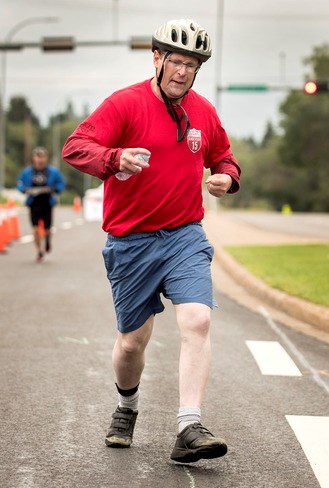Curtis Anderson never quits – never has, never will.
On Aug. 12, Anderson did the five-kilometre run for his sprint relay team at the St. Albert Triathlon, an outstanding feat, considering the brain injury he incurred 16 years ago took away his ability to walk and talk.
Anderson lost his balance when competing in a bull-riding competition at the Ponoka Stampede in 2002. He was struck in the head twice by the bull's head. After three weeks in a drug-induced coma and years of physical and occupational therapy, Anderson is now running independently.
"He's got to concentrate, but he's come a long way," said Chris Hatch, a lifelong friend of Anderson's and the swimmer on their relay team.
The St. Albert Road Runners and Triathlon Club (STARRT) hosted the weekend event. Hatch and Anderson had discussed doing a triathlon for years, and the St. Albert Triathlon seemed the perfect opportunity. Especially since Anderson, who lives in Minburn, didn't have to travel far to participate.
"It's very rewarding to know you can go out and take part in something. Not too many people get out and do a triathlon, and here I am out here today doing one," Anderson said with a proud smile.
Speaking from the heart
After the awards ceremony, Anderson spoke to the crowd about his brain injury. His message to people is to take concussions seriously, give yourself time to recover and invest in proper headgear. It's a hard-hitting message, specifically because Anderson's traumatic brain injury came two weeks after a concussion."I'm living proof of what can happen if you go back too soon after you take a hit."
Hatch said his friend talks to every person he sees, trying to raise awareness about brain injuries everywhere he goes. He added Anderson would have no problem walking right up to the Queen of England to start a conversation. In fact, Anderson probably spent as much of the race chatting with people as he did running.
Justin Nattress, the cyclist and third member of Anderson's relay team, said Anderson spoke to his senior men's hockey team last year. Anderson became a huge fan favourite and is often invited to watch the games. Nattress said he was inspired by Anderson's struggle to learn everything from scratch again.
"Taken from us, we complain about the subtlest things in the world. He's got to learn how to pick up a quarter off the ground, where we all take that for granted. That kind of just motivated us."
Keep on keeping on
Anderson doesn't let his injury hold him back. He said the biggest thing with recovery is you'll keep getting better for as long as you want to. He shows no signs of slowing down.Bull-riding events are probably where his motivational speeches have the greatest impact. This year Anderson spoke at the First Responders Rodeo in St. Albert. Coincidentally, there he met one of the paramedics who helped save his life.
Greg Wianko, vice-president of the First Responders Rodeo and current member of the Millet Fire Department, was a part of the standby crew at the Ponoka Stampede in 2002. He said he's not in this line of work to get recognition, but it was nice to meet someone whom he had helped out.
"I believe he'll be an inspiration to a lot of people who've gone through a traumatic brain injury," Wianko said. "His positive attitude is what really impresses me."




